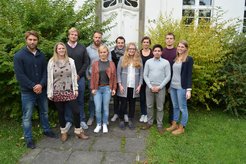Mobility of the future
Founding of the „Next Generation Mobility Group“ at the Max-Planck Institution for Dynamics and Self-Organization
In addition to the application „physics of an integrated public transport system“ (title EcoBus), the Max Planck-Institute for Dynamics and Self-Organization in Göttingen is developing a scientifically interdisciplinary research group called Next Generation Mobility (NGM)
"With our group ‘Next Generation Mobility’, we want to ensure a thorough evaluation of the EcoBus pilots and buildup a scientific network," emphasizes Jan Schlüter, the leader of the research group. The following projects have now started:
New Mobility Systems: As a joint project of the Max Planck Institute for Dynamics and Self-Organization, the department of Resource Management at the University of Applied Science and Art (HAWK) and the Department of Statistics and Econometrics at the University of Göttingen, students analyze the operating data of the moobil+ systems in Vechta and evaluate these statistically. Furthermore, they research the areal coverage of moobil+ and evaluate how the publicly supported bus system is embedded in the regional economy. In the future, other mobility systems are planned to be integrated throughout Germany and Europe.

Generation Sustainability: In cooperation with the Center of Statistics and Methods of the Faculty of Social Science at the University of Göttingen, scientists of the Max Planck Institute for Dynamics and Self-Organization are researching the mobility behavior of the young smartphone generation. How do they use the local public transportation? What kind of desires and needs does the generation of sustainability have in terms of public transportation? Exemplary, the researchers are interviewing students at the TU Clausthal. Further interviews are taking place at the schools Osterode I and II as well as in Einbeck. They are intended to give first conclusions on the mobility behavior of the young generation. In the future, other age classes and conurbations will also be included. For that purpose, a joint investigation is currently carried out with the University of Cologne.
Economic development through mobility: This is a joint project of the Max Planck Institute for Dynamics and Self-Organization and the HAWK, Faculty of Resource Management. In this project, students are analyzing the traffic situation and the traffic activity in the county of Goslar. They are trying to find out, which role the mobility offer plays in the county. In this connection, the current organizational and financial constellations are critically examined and the possibilities for a sustainable, needs-oriented restructuring are determined.
Complex Regions: Scientists of the Max Planck Institute for Dynamics and Self-Organization and the Department of Statistics and Econometrics at the University of Göttingen are researching the mobility structures and the mobility behavior of the citizens in Goslar and Dassel. Furthermore, the focus of 'Complex Regions' provides an insight in international mobility structures and patterns. In this regard, the mobility behavior of minibus-systems in South Africa is also researched.
Multi- and intermodal transportation systems: In cooperation with the two HAWK faculties Resource Management as well as Science and Technology, the Max Planck Institute for Dynamics and Self-Organization analyzes the mobility offer of the city of Holzminden. In course of that the researchers are checking, among other things, whether a common mobility infrastructure for small and medium-sized service companies would be profitable. Additionally, studies on the required IT- infrastructure as well as a business model development for such a system are being developed.
